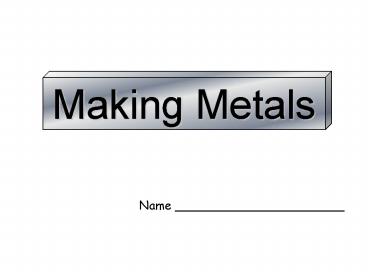Making Metals - PowerPoint PPT Presentation
1 / 14
Title:
Making Metals
Description:
Title: Metals Author: W Richards Last modified by: lcw Created Date: 12/2/2001 10:49:09 AM Document presentation format: On-screen Show Other titles – PowerPoint PPT presentation
Number of Views:99
Avg rating:3.0/5.0
Title: Making Metals
1
Making Metals
Name ______________________
2
Periodic table
Horizontal rows are called PERIODS
3
What does the periodic table tell you?
The SYMBOL of the element
The NAME of the element
The atomic NUMBER of the element
4
Group 1 The alkali metals
Li
Na
K
Rb
Cs
Fr
5
Group 1 The alkali metals
Some facts
1) These metals all have to be stored under ____
because they react with _______
2) Reactivity increases as you go _______ the
group. This is because the electrons are further
away from the _______ every time a _____ is
added, so they are given up more easily.
3) They all react with water to form an alkali
(hence their name) and __________, e.g
Words down, oil, shell, hydrogen, nucleus, water
6
The Transition Metals
Some facts
1) This section includes metals like gold,
mercury, iron, copper
2) They are all ______ and solid (except
_________)
3) They are ____ reactive than the alkali metals
4) They can form __________ compounds
Words hard, coloured, mercury, less
7
Some common symbols
Lithium ___ Sodium ___ Potassium ___ Calcium _
__ Magnesium ___ Iron ___ Oxygen ___ Nitrogen
___ Sulphur ___
Copper ___ Zinc ___ Aluminium ___ Gold ___ M
ercury ___ Fluorine ___ Chlorine ___ Hydrogen
___ Helium ___
8
The Reactivity Series
Potassium Sodium Calcium Magnesium Aluminium Carbo
n Zinc Iron Lead Copper Silver Gold
We can react metals with oxygen, water or acid to
get an idea of how reactive they are.
The Reactivity Series lists metals in order of
reactivity
9
Making Metals
Some metals are uncombined. This means we find
them pure in the ground, not joined to other
elements. Examples of uncombined metals are
silver and gold.
Most metals are not like this. We find them
combined with other elements. A metal ore is a
compound that we can dig out of the ground.
Most ores are compounds with a metal joined to
oxygen. These compounds are called metal oxides
(eg iron oxide).
To make a metal from a metal oxide we need to
separate the metal atoms from the oxygen atoms.
The more reactive the metal the tighter it is
joined to the oxygen so the harder it is to make!
10
The chemistry of making metals.
Potassium Sodium Calcium Magnesium Aluminium Carbo
n Zinc Iron Tin Lead Copper Silver Gold Platinum
Some silver can be made from silver oxide by just
heating the ore - no carbon is needed.
11
Extracting metals
- An example of a metal that is uncombined is
________. - A compound that we dig out of the ground to make
a metal is called an_________. - The more reactive the metal the __________ it is
joined to the oxygen in the ore.
Type of metal Extraction process Examples
High reactivity
Middle reactivity
Low reactivity
12
Making iron the Blast Furnace
13
Making Aluminium
Aluminium has to be extracted from its ore
(called bauxite) using electricity. This is
because aluminium is reactive so it is joined
tighty to the oxygen atoms in the ore.
14
Making iron
Iron is needed in very large amounts so it is
made in a specially designed furnace called a
_________ furnace.
A chemical called _________ is added to the
furnace and this chemical burns to make carbon
__________ gas.
The carbon monoxide gas pulls the oxygen away
from the iron oxide to make iron and carbon
_________ gas.
The iron is a liquid when it is made because the
temperature inside the furnace is so hot it has
________.
Words monoxide, carbon, melted, blast, dioxide































